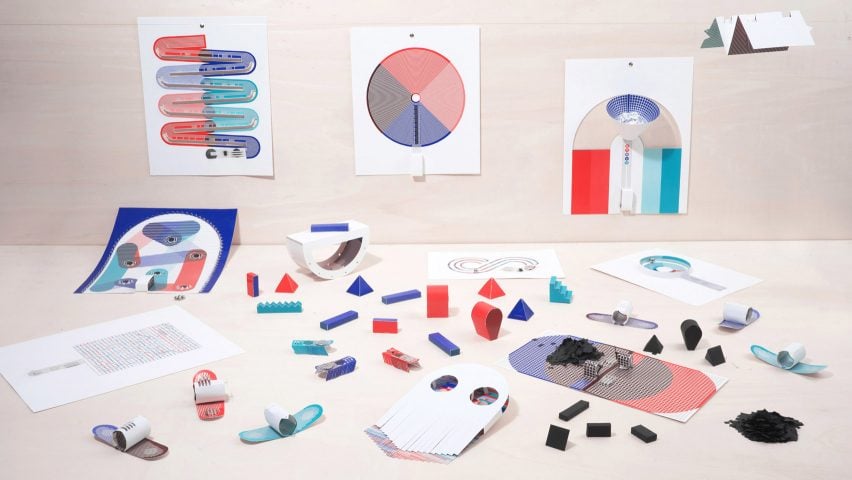French designers Marion Pinaffo and Raphaël Pluvinage have designed a set of 13 electronic toys that are cut, folded and assembled from paper printed in special ink.
The pair set out to create toys that would highlight the omnipresence of electronics, using paper printed with conductive or thermosensitive ink, and a kit of components such as batteries and propellors.
"As pointed out in its title, Papier Machine is mainly made of paper, a familiar material that one isn't afraid to mess up," Pinaffo told Dezeen.
"Paper can be layered, creased, folded, bent, cut, fragmented, frayed, flattened, hung on walls, assembled into volumes – these simple actions enable super low-tech though interactive experiences."
Among the toys included in Papier Machine is Switch, which requires a piece of bundled foil to be thrown into it to complete a circuit and allow five black dots to change colour. Another, the Playing Track, sends a ball bearing down a zigzag path to create different noises.
One toy needs a pencil to make marks and create different sounds, while a target-style device uses humidity sensors and colour-changing ink to respond to spitballs by revealing secret letters. The pair also used wind sensors to create a ghost-shaped toy with paper fringes that bleeps when it's blown on.
"We wanted to show that electronics are not magical, but have chemical and physical principles and that all these invisible sensors have shapes," added Pinaffo.
Pinaffo and Pluvinage based the bright colours and patterns of the Papier Machine toys on classic arcade games, creating pieces that were "both functional and decorative" with space to incorporate the circuitry required.
"We used a geometrical and abstract alphabet of shapes to leave room for the user's appropriation," added Pinaffo. "Anyone is free to see monsters, or cities via sports fields or race tracks in our toys, in the same way you see different things when you look at the electronics of mobile phones under the microscope."
The duo say that the toys will last as long as their owner cares for them but concede that paper is a more fragile material. They suggest damaged toys can be fixed with tape, or broken circuits repaired using silver pen.
Papier Machine has already been shown at the Musée des Arts Décoratifs in Paris, and the pair are also working on bigger versions of the toys that could be displayed floor-to-ceiling in other exhibition spaces or museums.
Technology Will Save Us has similarly used toys to help children have a more tangible understanding of technology, with interactive learning kits based on conductive dough.

